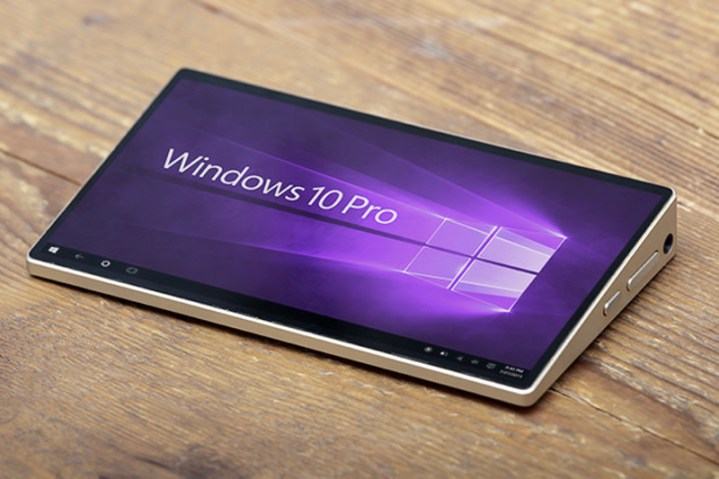
Backers of the Indiegogo project featuring what was billed as the “world’s most versatile mini PC,” the Sirius A and Sirius A Pro, are now finally receiving their pre-ordered units. Those who joined the list after January 20, 2018, should receive their units soon. For everyone else not involved with the Indiegogo project, the device will be sold through Dutch electronics store BCC and will likely end up listed on Newegg as well.
Created by Ockel Computers, the Sirius A miniature PC is an amazing achievement in that it expands on your typical pocket-sized PC to include a built-in 6-inch display with a 1,920 x 1,080 resolution and multitouch support. The screen is backed by Intel’s four-core Atom x7-Z8750 “Cherry Trail” processor, which was released at the beginning of 2016. Overall, it only weighs 11.8 ounces and measures just 0.3 inches at its thinnest point.
What separates the vanilla and “pro” versions is their amount of memory and storage. The Sirius A packs 4GB of LPDDR3 system memory and 64GB of storage, while the Sirius A Pro ships with 8GB of system memory and 128GB of storage. Both are sold in three color choices: Venus Gold, Mercury Grey, and Moon Silver.
Despite the size, Ockel’s miniature PC packs plenty of connectivity options. On the 0.8-inch thick back, you’ll find two USB-A ports (5Gbps), one USB-C port (5Gbps), an HDMI 1.4a port, one DisplayPort 1.2 connector, and a Gigabit ethernet port. On the bottom are four slots covering two one-watt speakers, while a headphone jack resides on the right side of the PC. The left side plays host to a Micro SD card slot and a fingerprint scanner.
That’s still not all. A 5MP 1080p camera, a microphone array, and an ambient light sensor reside in the display area. It also has wireless connectivity, sporting Bluetooth 4.2 and Wireless AC components. All of this compact hardware goodness is powered by a 3500mAh battery promising up to 3.5 hours of video playback. The miniature PC ships with a 12.5-watt power adapter.

According to Ockel, there are no fans mounted inside the miniature PC to cool the processor, but the device also can’t rely on your typical passive cooling design. To keep the chip from overheating, Ockel designed the bottom of the device using the pattern of the Canis Major constellation, where the Sirius A star just happens to reside. The bottom serves as a heat sink to dissipate the heat generated by the Intel processor without the need for a noisy fan.
Ockel bills the Sirius A as a complete desktop in the palm of your hand. It’s based on the 64-bit release of Windows 10 Pro or Home, thus you may be better off using the Sirius A Pro model given it has more storage capacity. You can connect an external display and peripherals to create a workstation, or use the pocket-sized device to stream, transfer, and control your favorite media, services, and smart home devices.
The Sirius A sells for $699, while the Sirius A Pro sells for $799.


